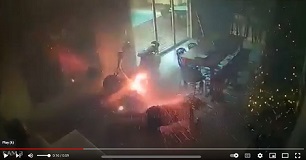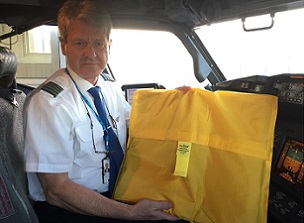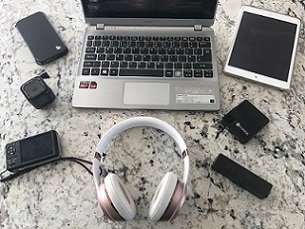 Scooter erupts in flames after lithium battery catches fire inside house
Scooter erupts in flames after lithium battery catches fire inside house
 Man showered in sparks as scooter erupts in flames after lithium battery catches fire inside house
Man showered in sparks as scooter erupts in flames after lithium battery catches fire inside house
 A pilot with a lithium battery fire containment bag
A pilot with a lithium battery fire containment bag
 All these personal electronic items are powered by lithium ion batteries
All these personal electronic items are powered by lithium ion batteries
 The confined space of a passenger aircraft is the last place you'd want a lithium battery fire
The confined space of a passenger aircraft is the last place you'd want a lithium battery fire
An insurance giant has revealed a huge increase in fires caused by batteries on e-bikes and e-scooters as frightening video footage emerges of one catching fire inside a house.
In the footage the bike is seen catching fire and then exploding as a panic-stricken man in his underpants tries to tackle the blaze.
He ends up being showered by sparks as he slips to the floor but was not thought to have been badly hurt. To watch the full video go to https://bit.ly/3Ph6SaA
A Freedom of Information request by Zurich reveals that lithium battery-powered e-bikes and e-scooters were responsible for 167 fires in the UK last year, compared to just 67 in 2020.
Blazes this year are on course to exceed 2021 with 161 incidents already recorded to the end of September – a 28% increase on last year’s monthly average.
Fire investigators say blazes are often linked to poor quality, damaged or incorrectly charged lithium batteries which can explode if not handled properly.
Zurich fears a boom in Christmas sales combined with the squeeze on household budgets could drive consumers towards cheaper products that may not meet safety standards.
An investigation by consumer safety charity Electrical Safety First found 59 different listings online for e-bike chargers that fell below necessary safety standards.
A number of chargers didn’t even contain a fuse which means there would be no way for the charger to cut out in the event of a fault, posing a serious risk of fire.
Earlier this year London Fire Brigade urged caution over some DIY e-bike conversion kits selling on the internet, a trend they believed was to blame for a spate of fires in the capital.
Sixty firefighters were needed to tackle a blaze on the 12th floor of a tower block in Shepherd’s Bush in June caused by a faulty e-bike battery. A month later five people ended up in hospital after a fire in Walthamstow started by an e-bike. In November, an exploding e-scooter battery set a Hampshire house on fire.
Zurich has seen several incidents involving lithium batteries, including an £84,000 claim for a scooter that went up in flames in a garage, £13,000 for an e-bike that exploded in a customer’s bedroom and £6,000 for another that caught fire in a living room.
Alastair Thomson, Zurich’s Head of Property claims, said: “E-bikes and e-scooters bring new benefits but also new risks. We’re concerned by an alarming rise in fires caused by devices that are unsafe or charged incorrectly.
“Christmas shoppers should be aware of the potential dangers of lithium batteries which, if not treated properly, can pose a serious fire risk.
“If you’re shopping for gifts powered by lithium batteries always buy from a reputable brand and retailer and ensure that safety standards have been met.”
Martyn Allen, Technical Director at Electrical Safety First, added: “We urge people to be extremely careful where they buy e-scooters and e-bikes, as well as the batteries and chargers for them.
“The lithium-ion batteries that power these vehicles can cause explosive fires if they are of poor quality or misused, so exercising real care in how they are used and stored is also essential. Only buy products like these from a reputable retailer you know and trust and always follow the manufacturer's guidance on using them, including safe charging.”
Families have also been warned about the fire risks of lithium batteries found in other Christmas gifts ranging from children’s toys to laptops.
According to Zurich’s analysis there were 168 other lithium battery blazes in 2021 – up 63% from 103 in 2020. Blazes are on course to exceed to last year with 159 to the end of September.
Recent claims include a cordless vacuum cleaner that burst into flames causing £65,000 of damage, a £36,000 fire involving a child’s electric bike that destroyed a garage and a £9,000 blaze sparked by a remote-control aircraft.
Alastair added: “Never use or charge a battery if it is damaged and always use a compatible charger when powering up devices.”
A company which devised an award-winning invention to deal with lithium battery fires on board planes is now researching using the same technology to deal with fires caused by e-bikes and e-scooters.
Environmental Defence Systems based in Huddersfield, West Yorkshire, won the Queen’s Award for Enterprise for Innovation for the AvSax lithium battery fire mitigation bag, the highest award any business can get.
People take hundreds of personal electronic gadgets on board planes ranging from mobile phones and iPads to laptops and vapes.
AvSax (www.avsax.com) is the world’s best-selling fire containment bag for personal electronic devices on aircraft and are now on more than 16,770 aircraft operated by over 100 airline companies.
AvSax have been used 33 times to deal with emergencies since the start of 2017 and every time they have been deployed the aircraft has been able to complete its journey safely with no need to divert or make an emergency landing.
Many air ambulance helicopters in the UK now carry AvSax. More than 20 helicopters operated by specialist aerial emergency medical services company Babcock are equipped with AvSax following a detailed look into the possible risks posed by lithium-ion batteries on emergency aircraft.